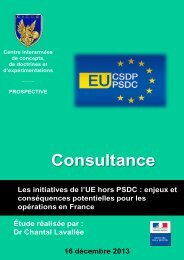Conference
science-research-bulletin-2013-conference
science-research-bulletin-2013-conference
You also want an ePaper? Increase the reach of your titles
YUMPU automatically turns print PDFs into web optimized ePapers that Google loves.
EUROPEAN POLICE SCIENCE AND RESEARCH BULLETIN<br />
SPECIAL CONFERENCE EDITION<br />
and decisions to maximise the benefit of reduced<br />
resources to widen the market and to increase<br />
the funding sources – if possible without reducing<br />
quality of training and in line with rules, training<br />
needs, political and public expectations towards<br />
police training. Often this seems to be a mission<br />
impossible.<br />
CHALLENGES AND RISKS<br />
The economic constraints should not only be<br />
seen as an obstacle for the further development of<br />
police training. It should be taken as a challenge<br />
and a chance for all stakeholders and decisionmakers<br />
in this field for a thorough examination<br />
of the current system and situation and for an<br />
adaptation of training/education according to the<br />
new and changing conditions. This examination<br />
has to respect risks, as they are seen by experts.<br />
Here only a few aspects of potential challenges<br />
and risks will be presented for considerations<br />
which could be relevant for dealing with<br />
budgetary restrictions.<br />
INTERNATIONALISATION/<br />
EUROPEANISATION OF POLICING<br />
Quick solutions for solving budgetary problems<br />
in individual countries and in CEPOL without<br />
respecting European standards of police training<br />
and the achievements in the last two decades –<br />
particularly regarding training of senior officers and<br />
police experts – could have long-term consequences<br />
not only for the quality of training/education but<br />
particularly for the international police cooperation.<br />
Effective police cooperation in Europe is not<br />
only based on contracts, agreements and joint<br />
institutions and instruments. Just as important are<br />
police officers with common attitudes, a common<br />
understanding of and knowledge about police<br />
and policing. European training standards, training<br />
programmes (e.g. joint training activities, common<br />
curricula, and exchange programmes) as well as<br />
funding programmes can be seen as important<br />
pillars for international cooperation.<br />
We cannot expect that the budget restrictions for<br />
police and police training will be eased in most of<br />
the European countries soon. On the contrary there<br />
will be new and more cuts. Therefore the situation<br />
has to be seen as a specific challenge for all decisionmakers<br />
in charge of police training in Europe<br />
to find solutions that will in the end strengthen<br />
cooperation. Such solutions could be<br />
• Common or joint development, running and<br />
funding of costly training activities (e.g. master<br />
programmes, expert training, train the trainers,<br />
exchange programmes, distance learning);<br />
• a clear refusal of competition between police<br />
colleges and a turn (back) to cooperation;<br />
• strengthening bilateral and regional training<br />
cooperation with splitting the costs.<br />
But the risks have to be taken into account: time<br />
factor, bureaucracy, and language barriers.<br />
COST-BENEFIT ANALYSES<br />
More and more cost-benefit or efficiency analyses are<br />
taken or asked - as “alibi” for decisions for eliminating<br />
or reducing “unnecessary” or “inefficient” training.<br />
In fact the economic situation is an opportunity for<br />
healthy examinations of existing police training/<br />
education systems, programmes or curricula.<br />
The economic situation can be seen as a challenge<br />
for decision-makers to reconsider and modernise<br />
the current police national training/education as<br />
well as the cooperation in this field. In all national<br />
police training systems can be found on the one<br />
hand removable duplications, non-updated or<br />
useless parts of the curricula, unnecessary elements/<br />
ballast, unscreened traditions, (party-) political<br />
interests, idle capacities and on the other hand<br />
disregarded changes (new threats and technologies,<br />
internationalisation) in police environment or not<br />
respected findings/recommendations of police<br />
research in the curricula.<br />
However, training experts are aware of the<br />
weaknesses and risks of cost-benefit and efficiencyanalyses<br />
in the field of training. They more see<br />
the necessity of demand analyses, so that a quick<br />
response by training activities to changes of the<br />
threat assessment or new police demand will<br />
be possible. Decisions or measures only based<br />
on cost analyses may have long-term negative<br />
consequences for the training system as such.<br />
It will take away the important innovative and<br />
creative element of training for police and policing.<br />
Therefore eliminating or reducing training activities<br />
should be based more on demand analyses than<br />
on costs reduction strategies.<br />
131





